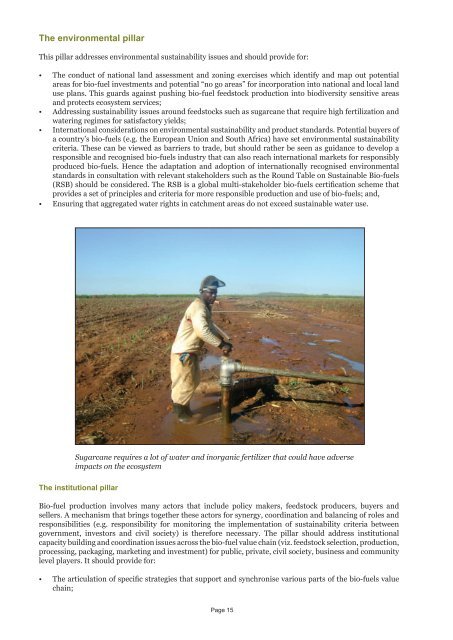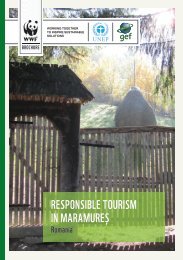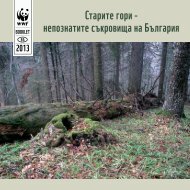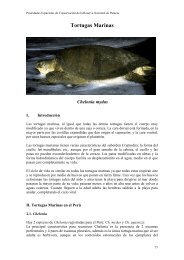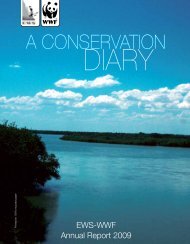Assessment of sugarcane outgrower schemes for
Assessment of sugarcane outgrower schemes for
Assessment of sugarcane outgrower schemes for
You also want an ePaper? Increase the reach of your titles
YUMPU automatically turns print PDFs into web optimized ePapers that Google loves.
The environmental pillar<br />
This pillar addresses environmental sustainability issues and should provide <strong>for</strong>:<br />
• The conduct <strong>of</strong> national land assessment and zoning exercises which identify and map out potential<br />
areas <strong>for</strong> bio-fuel investments and potential “no go areas” <strong>for</strong> incorporation into national and local land<br />
use plans. This guards against pushing bio-fuel feedstock production into biodiversity sensitive areas<br />
and protects ecosystem services;<br />
• Addressing sustainability issues around feedstocks such as <strong>sugarcane</strong> that require high fertilization and<br />
watering regimes <strong>for</strong> satisfactory yields;<br />
• International considerations on environmental sustainability and product standards. Potential buyers <strong>of</strong><br />
a country’s bio-fuels (e.g. the European Union and South Africa) have set environmental sustainability<br />
criteria. These can be viewed as barriers to trade, but should rather be seen as guidance to develop a<br />
responsible and recognised bio-fuels industry that can also reach international markets <strong>for</strong> responsibly<br />
produced bio-fuels. Hence the adaptation and adoption <strong>of</strong> internationally recognised environmental<br />
standards in consultation with relevant stakeholders such as the Round Table on Sustainable Bio-fuels<br />
(RSB) should be considered. The RSB is a global multi-stakeholder bio-fuels certification scheme that<br />
provides a set <strong>of</strong> principles and criteria <strong>for</strong> more responsible production and use <strong>of</strong> bio-fuels; and,<br />
• Ensuring that aggregated water rights in catchment areas do not exceed sustainable water use.<br />
Sugarcane requires a lot <strong>of</strong> water and inorganic fertilizer that could have adverse<br />
impacts on the ecosystem<br />
The institutional pillar<br />
Bio-fuel production involves many actors that include policy makers, feedstock producers, buyers and<br />
sellers. A mechanism that brings together these actors <strong>for</strong> synergy, coordination and balancing <strong>of</strong> roles and<br />
responsibilities (e.g. responsibility <strong>for</strong> monitoring the implementation <strong>of</strong> sustainability criteria between<br />
government, investors and civil society) is there<strong>for</strong>e necessary. The pillar should address institutional<br />
capacity building and coordination issues across the bio-fuel value chain (viz. feedstock selection, production,<br />
processing, packaging, marketing and investment) <strong>for</strong> public, private, civil society, business and community<br />
level players. It should provide <strong>for</strong>:<br />
• The articulation <strong>of</strong> specific strategies that support and synchronise various parts <strong>of</strong> the bio-fuels value<br />
chain;<br />
Page 15


